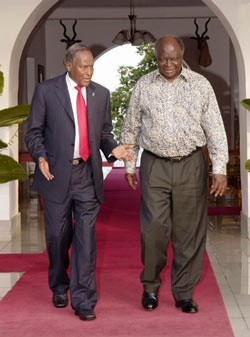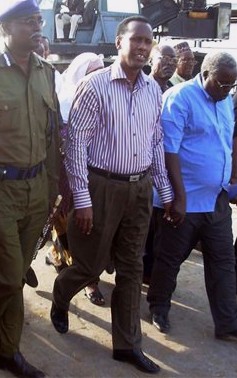|
Somalia Politics Islamists defeated; hope returns to Somalia
Over the last two weeks, the formerly impotent transitional government has managed to extend its power all over Somalia, strongly helped by a large Ethiopian force - that defeated the powerful Islamist militia - and Kenyan forces, which sealed off the Somali border to hinder Islamists from regrouping in Kenya.
The transitional government led by interim President Abdullahi Yusuf Ahmed thus for the first time seems close to take effective control of Somalia. For the last year, it has been based in the interior town of Baidoa, controlling only a very small territory and failing to disarm the militias that controlled the rest of country. Also, its frequent calls to the international society to send peace-builders had been without result. In contrast, neighbour states now seem to be willing to make a real effort to help President Yusuf's government to consolidate its newfound control over Somalia. President Yusuf today was received by Kenyan President Kibaki in Mombassa, discussing "the peace process in Somalia," according to the Kenyan presidency. The Kenyan President currently heads the regional grouping IGAD and has pledged to convene a "summit early in the new year in order to urgently discuss the unfolding events in Somalia." African peacekeepers in support of the transitional government will be on the agenda and by now, both Uganda and Nigeria have offered to send contingents. It is hoped that these African peacekeepers could take over for Ethiopian troops as soon as possible to avoid further anti-Ethiopian sentiments among sceptical Somalis. Also the Ethiopian Prime Minister, Meles Zenawi, today told the Addis Ababa parliament that he wanted his troops to withdraw from Somalia as soon as possible, hopefully within two weeks, if peacekeepers were able to take over by then. "Somalis are asking never to return to anarchy," PM Meles however reminded Addis lawmakers, adding that Ethiopia "will not stop supporting Somalis" until that aim was reached. Mr Meles noted that the Somali transitional government did not have sufficient well-trained troops and that Ethiopia and future peacekeepers needed to focus on strengthening and educating the regular Somali army. But Mr Meles generally maintained a humble tone when addressing the Ethiopian parliament and answering opposition MPs. It seemed clear that Ethiopians are not willing to spend larger sums on maintaining a costly Somali military operation over the long run. National budgets call for a quick end to the Ethiopian intervention, with a robust takeover by international peacekeepers. If the plan developed by Ethiopia and the Somali transitional government is well implemented, President Yusuf can soon disarm remaining Somali militias and take effective power in the country, which has lacked a central government since 1991. For that, however, foreign peacekeepers must be sent quickly into Somalia to support the weak government. There is willingness to send troops, but there are still no funds made available to pay for that operation. By staff writers © afrol News - Create an e-mail alert for Somalia news - Create an e-mail alert for Politics news
On the Afrol News front page now
|
front page
| news
| countries
| archive
| currencies
| news alerts login
| about afrol News
| contact
| advertise
| español
©
afrol News.
Reproducing or buying afrol News' articles.
You can contact us at mail@afrol.com









